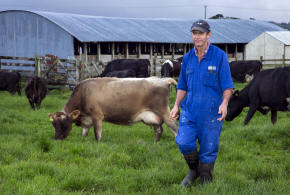|
The
agreement, which has been in negotiation since mid-2018, will
remove tariffs on a wide range of products and be the first
struck by the EU to include potential sanctions for violations
of environmental or labour standards.
Tariffs will fall for EU exports such as clothing, chemicals,
pharmaceuticals and cars, as well as wine and confectionary. The
EU will increase by 10,000 tonnes its quota of New Zealand beef,
a sensitive area for France in particular, as well as raising
volumes for lamb, butter and cheese.
The New Zealand government has said the agreement provides
tangible gains into a restrictive agricultural market.
But the New Zealand meat and dairy sectors say this has very
little impact on them.
Simon Tucker, a director of trade at dairy giant Fonterra, said
in a statement that outcomes for dairy were very disappointing
and reflect the degree of protectionism afflicting dairy trade
globally.
Tucker said new commercial opportunities from the FTA for dairy
products remained constrained relative to the relative size of
the market.
Sirma Karapeeva, chief executive of the Meat Industry
Association, added in a separate statement the FTA did not
provide commercially meaningful access for meat exporters.
"With more volatility in global markets, diversification is
important, and a high-quality FTA with the EU was critical in
helping us achieve this," she said.
New Zealand agriculture exporters have long struggled to get
good access to the market and analysts say the outcome should
not have come as a huge surprise.
"Negotiating a deal with one of world’s most protectionist
economic blocs was always going to be difficult and as such the
benefits for broader New Zealand Inc. are modest," said Westpac
Senior Agri Economist Nathan Penny.
He added that small New Zealand exporters such as firms in the
kiwifruit, apple, wine, manuka honey and seafood sectors will
see tariffs eliminated.
(Reporting by Lucy Craymer; Editing by Kim Coghill)
[© 2022 Thomson Reuters. All rights
reserved.]
This material may not be published,
broadcast, rewritten or redistributed.
Thompson Reuters is solely responsible for this content.

|
|





